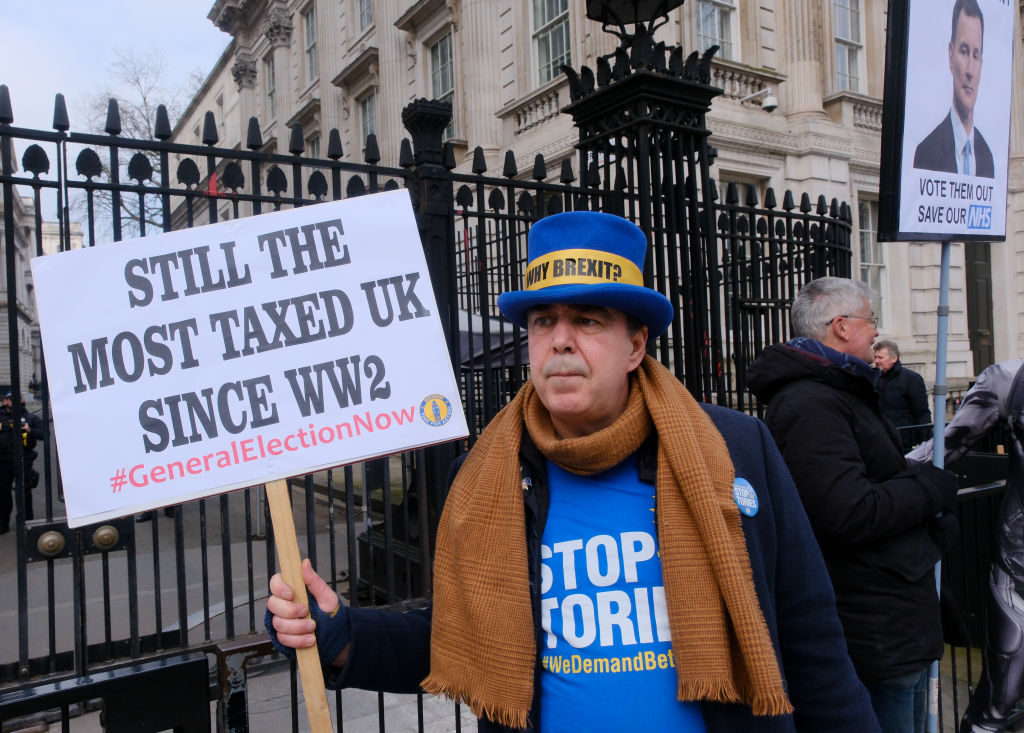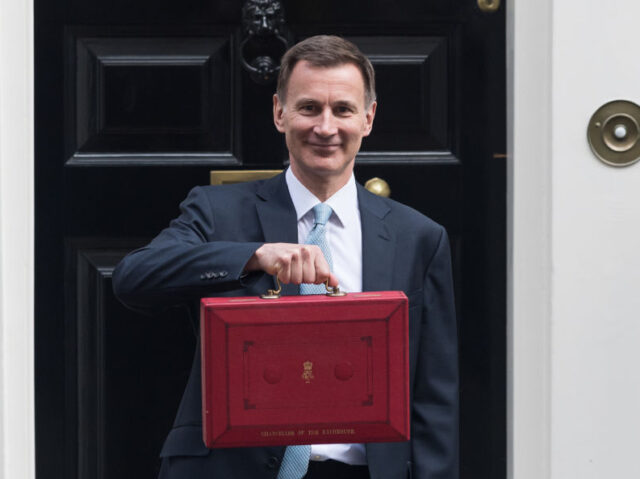The British government is making a last-ditch bid for votes with a budget giveaway tax cut, one that unfortunately looks to be absolutely dwarfed by the size of tax hikes otherwise.
Live Updates — what’s in the budget?
1415 — Opposition response
You really know you’re in trouble as a Conservative politician when the left are credibly attacking you on taxes being too high, and your economic plans being too reliant on mass migration. This is genuinely damaging:
…when the chancellor says Britain has grown more quickly than countries like Germany over the last 14 years, I’m sure they will be shocked to learn that this is a statistical slight of hand. When it comes to GDP per capita, in other words the growth that makes the difference to the pockets of working people, their record is much worse. Indeed, in per capita terms our economy has not grown since the first quarter of 2022. The longest period of stagnation Britain has seen since 1955.
If the party opposite really wants to know what hides in the Chancellor’s spreadsheets, then they will see it’s only the record levels of migration they have delivered which has prevented an even deeper decline, and that is the record they must stand on at the election.
Because while on these benches we do not demean for a second the contribution migrants make to a thriving economy, it is high time the party opposite was honest with the British public about the role immigration plays in their economy policy, because right now in terms of growth that is all they have. There is nothing else.
Through his response opposition leader Keir Starmer managed to get in “give with one hand and take even more with the other” three times, which I’m sure we can expect to hear a lot more as the election campaign heats up.
Other attacks include reminding Sunak he’d previously promised a one per cent cut in income tax this year — which was nowhere to be seen — and citing the Conservtives using fiscal drag, as elaborated upon below.
1350 — Finally, the red meat
Hunt has got onto the real headline grabbers as his final item before conceding the floor. While nothing said can get away from the fact taxes are at record-high levels and these cuts won’t meaningfully change that, Hunt was certainly speaking the language of his voter base, and throwing in plenty of barbs at the Labour opposition as he did so. Saying the government should work harder with the money it has, Hunt said: “It’s not fair to ask taxpayers to pay for more when public service productivity has fallen… keeping taxes down matters for Conservatives in a way it can never for Labour.”
Again, using that Conservative language in soundbites he will certainly hope may be heard by the public later, the Chancellor continued: “if we want to encourage hard work, we should let people keep as much of their own money as possible… countries with low taxes generally have higher growth… we know lower-tax economies have more energy, more dynamism… and that’s Britain’s future too”.
Fair enough, but what does that mean? It’s a change in the way tax works for the international wealthy elite, replacing the long-controversial ‘non-dom’ rules on those who live in the UK but hold their wealth abroad to streamline their tax liabilities. This will go down badly with Labour who wanted to be able to say they’d done that themselves.
The old system, Hunt said while being drowned out by jeers from the left-wing benches was an “outdated concept” and the replacement will be a “modern, simpler, fairer residency-based system”. Crucially, Hunt says rather than using the extra money raised from taxing the wealthiest more to grow government spending, he’d use it to cut taxes. That’ll go down well with Conservative voters, no doubt.
But absolutely no surprises when it comes to taxes. The tuppence in the pound cut to National Insurance soft-launched yesterday is there, but with no extras to really make the headlines or fetch the Conservatives some feel-good goodwill from the electorate. The tuppence cut will be worth £450 a year to an average-income worker, Hunt says, and pushing back about the constant drumbeat of reminders about how very large the national tax burden is now, he also hit back with a quip about the “effective personal tax rates” now being at their lowest since the 1970s. One for the fact-checkers, no doubt.
Earlier in the day, we spoke of how the United Kingdom taxes income twice, with the second National Insurance rate working to crudely conceal the true level of personal taxation in the UK from a casual glance, at the least. Hunt nods to this, making a long-term promise to — it seems — abolish the tax altogether… as long as his party keeps getting voted back in. “Our long-term ambition is to end this unfairness”, he said.
1320 — Protests outside Downing Street
Chancellor Hunt is giving his speech in the Houses of Parliament, but a protest churns on outside his official office at Downing Street. When even the left-wing are pointing out taxes are too high, you know something must be wrong…

LONDON, UNITED KINGDOM – MAR 06, 2024 – Budget Day, as protests at Chancellor of the Exchequer Jeremy Hunt are seen outside Downing Street, London. (Photo credit should read Matthew Chattle/Future Publishing via Getty Images)
1310 — Get mothers out of the home and into the office, says Hunt
The Chancellor is treading over favoured ground, saying he wants to get “parents” into work. Of course, as we know from his previous remarks on this, he means “women” who be believes are “wasted” raising their own children. It isn’t a very ‘conservative’ point of view, but it is totally in character for the pursuit of GDP at the expense of all else. Again invoking his plans as an alternative to mass migration — apparently without irony — Hunt told the Chamber:
… the economy has around 900,000 vacancies. It would be easy to fill them with migration, but with 10 million adults of working age who are not in work that would be [wrong]… our plan will mean over 60,000 parents will enter the workforce in the next four years… more people in work, more jobs.
As reported earlier this week:
The British government is looking to increase “female participation” in the workforce to generate “more taxes being paid”… [Hunt] fell back on now well-worn Tory Party hostile rhetoric on mothers which has branded staying at home to raise one’s offspring as being economically “inactive” or “wasted”.
… Reviewing the brusque comments from the Chancellor, the campaign group Mothers At Home Matter (MAHM), which calls for fair taxation for families, noted the claim that women spending time with their own young children is a “waste” of human potential demonstrated that there is “not much hope for supportive taxes for families in [the] forthcoming budget… Forcing mothers into the workforce will not lead to a prosperous and happy nation.”
Indeed, the fiscal benefit to the taxman of leading mothers away from their families and into work is, of course, considerable. Not only is the new income of the parent taxed, but the real work of raising children is brought into the economy and commercialised, so the income of the extra care workers needed to service rising demand can be taxed too.
1240 — Conservative plans mean less immigration. Really?
Hunt goads Labour by saying his plans to increase GDP per capita means being able to grow the economy without relying on unlimited mass migration, which he says the Labour Party supports. Quite the claim given the enormous, historic levels of mass migration experienced by the United Kingdom over the course of the Conservative governments of the past 14 years, particularly given how Hunt and his tribe have insisted immigration is the shortcut to economic growth. Read all about it here.
1233 — Jeremy Hunt is now standing at the dispatch box
The Chancellor has started by saying despite challenging global fiscal headwinds, the UK government has continued to grow, but “of course” interest rates continue to remain high. Cold comfort for homeowners.
Read the context for today’s announcements below:
UK Chancellor Jeremy Hunt has held up the famous traditional red briefcase of state on Downing Street, heralding budget day, where the government sets out its spending and taxing plans for the coming year.
The UK’s Tory government published the Spring Budget, possibly the last major fiscal event before the country goes votes in the General Election this year, with a tuppence-in-the-pound cut to the country’s second income tax already soft-launched. Following years of soaring taxes, largely clawed into the state’s coffers from the income of working Britons through fiscal drag — colloquially best known as ‘stealth taxation’ — Rishi Sunak’s ‘Conservatives’ best hope now is that the economy shows signs of recovery between now and election day — likely to be in the autumn or winter — and that voters don’t look too hard at what’s happened to their tax payments over the past decades, and detect the deception.
As soft-launched on Tuesday by the government, the budget today will include a tuppence cut to the rate of National Insurance (N.I.). This follows another cut to the same tax last year, taking it to four pence in the pound shaved off in the past year. The United Kingdom is somewhat unusual in that is has two national income taxes: while N.I. was originally sold as being levied to specifically fund social spending like pensions, in practice both taxes put money into the general ‘pot’ of government cash and its main purpose now, as widely perceived, is as a convenient figleaf hiding the true level of UK taxation from causal comparison.
Far from this money being saved to pay for future pensions, current taxpayers fund the present generation of retirees, promising a future pension crisis with the UK’s shifting demographics towards a society where, proportionally, fewer work.
As things stand, taxes in the UK are at record highs, scraping the biggest levels seen since the Second World War when much of the economy was nationalised or otherwise directed in a massive effort to support the armed forces. As economic researcher Torsten Bell noted last year of the last attempt to grab headlines with a minor tax cut: “Even after today’s tax cuts, the tax burden reaches its highest level for 70 years – up by well over £4,000 per household since on pre-pandemic levels.”
Much of this increase has been achieved through what is known as stealth taxation, where during times of inflation the fixed income levels where different tax bands kick in don’t rise at the same speed, if at all. Through this artifice, as inflation pushed up the income of ordinary working Britons without increasing their spending power, they are pushed into higher income brackets, and lose more of their income to the government.
Through the slow ratchet of this process — fiscal drag — over long periods of time, huge changes in the way taxation works has been observed. The UK ‘higher band’ of taxation, for instance, was called a tax on the super-rich in the 1980s, but today hundreds of thousands of teachers, police officers, and nurses lose a slice of their income, although they could in no way be considered elite earners.

COMMENTS
Please let us know if you're having issues with commenting.